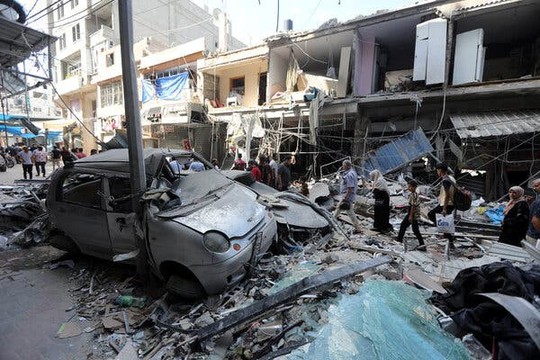Damage from Israeli airstrikes in the southern Gaza Strip last week
Photo: The New York Times
Speaking from the Oval Office, President Biden tied American support for Ukraine and Israel together, describing both nations as democracies fighting enemies determined to “completely annihilate” them….
But Israel’s counterattack on Gaza, its threats to mount a ground invasion and America’s tight embrace of its most important Mideast ally, regardless, have prompted cries of hypocrisy, writes The new York Times.
Such accusations are not exactly new in the Middle East conflict. But the dynamics of the dual crises have gone beyond Washington’s desire to rally global support to isolate and punish Russia for invading its neighbor.
Increasingly, the Middle East region is emerging as a renewed front in the struggle for influence in the Global South — the collective name for the developing nations of Africa, Asia and Latin America — pitting the West against Russia and China.
“The war in the Middle East will drive a growing wedge between the West and countries like Brazil or Indonesia, key swing states of the Global South,” said Clifford Kupchan, chairman of the Eurasia Group, a New York-based risk assessment organization. “That will make international cooperation on Ukraine, like sanctions enforcement on Russia, even harder.”
President Joko Widodo of Indonesia, the world’s most populous Muslim nation, which does not recognize Israel, has condemned the “ongoing injustices against the Palestinian people.” The Gaza war will only worsen the global situation, he said, threatening higher oil prices after the Ukraine war already slowed wheat exports.
President Luiz Inácio Lula da Silva of Brazil has criticized U.S. weapons supplies to Ukraine as “encouraging” the war but blamed both sides for the conflict and offered to mediate. Brazil, as president of the United Nations Security Council this month, drafted a Gaza humanitarian cease-fire resolution, which also explicitly condemned “heinous terrorist attacks by Hamas.”
After the United States vetoed the resolution because it did not mention Israel’s right to self-defense, Brazil’s ambassador to the United Nations, Sérgio França Danese, expressed frustration. “Hundreds of thousands of civilians in Gaza cannot wait any longer,” he said. “Actually, they have waited far too long.”
Arab leaders — including President Abdel Fattah el-Sisi of Egypt, King Abdullah II of Jordan and the Saudi foreign minister, Prince Faisal bin Farhan al-Saud — all lashed out in speeches on Saturday at the Cairo peace summit at what they called double standards.
“Anywhere else, attacking civilian infrastructure and deliberately starving an entire population of food, water, basic necessities would be condemned, accountability would be enforced,” said King Abdullah. “International law loses all value if it is implemented selectively.”
Palestinians have criticized Western capitals for not expressing outrage over the bombing of Gaza similar to their labeling of Russian missile attacks against Ukrainian cities and infrastructure as “barbaric” and “crimes against humanity.”
China has also been seeking to expand its influence in the Middle East, having recently mediated a deal between Iran and Saudi Arabia to restore relations. Russia and China have refused to condemn Hamas. They have instead criticized Israeli treatment of Palestinians, especially its decision to cut off water and electricity to Gaza and the civilian death toll there. They have called for international mediation and a cease-fire before Israel considers that its war has fully begun.
The Palestinian cause has long thrived in the Global South, so the Gaza war has only added to resentments in Africa, Asia and Latin America that the West is treating Ukraine as a special case because it is a European war. They denounce the money spent on arming Ukraine while international development goals are ignored.
There is a perception that the West “cares more about Ukrainian refugees, about Ukrainian civilians suffering, than we do when they are suffering in Yemen, in Gaza, in Sudan, in Syria,” said Hanna Notte, a Berlin-based Eurasia analyst at the Center for Strategic and International Studies.
That helps illustrate why the West has failed to woo countries like India and Turkey into supporting sanctions against Russia. Given the situation in Gaza, that effort is unlikely to succeed any time soon.
“It is a huge headache for Western diplomats because they have spent a lot of time this year trying to charm the Global South,” said Richard Gowan, the U.N. director for the International Crisis Group. “We have seen support and interest in Ukraine fading among U.N. members over the course of this year.”
read more in our Telegram-channel https://t.me/The_International_Affairs

 11:28 30.10.2023 •
11:28 30.10.2023 •























